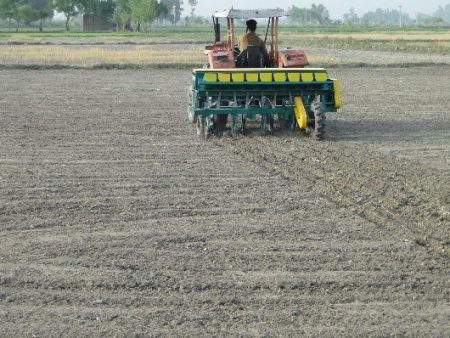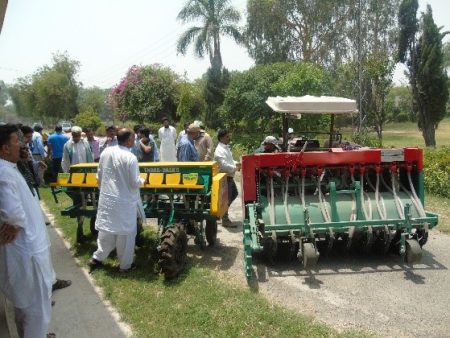
ISLAMABAD (CIMMYT) – Farmers and research partners are praising innovative, locally manufactured farm implements that support conservation agriculture, with costs savings and soil and water conservation benefits, in rice-wheat farming rotation that cover more than 2.2 million hectares in Pakistan.
In a meeting in May 2017 at the Rice Research Institute Kala Shah Kaku, Punjab Province, Pakistan, farmers expressed satisfaction with the performance of nearly 200 locally-produced implements they received to test during 2016-2017, which allow seed of rice, wheat and other crops to be sown directly into unplowed and unflooded fields, including the stubble and other residues from preceding crops.
In traditional practices, rice plantlets are transplanted by hand into puddled fields, after 4 to 6 weeks of being grown in nurseries on the borders of the paddies.
“This requires enormous amounts of water and labor, both of which are expensive and in short supply,” said Muhammad Akhter, Director of Pakistan’s Rice Research Institute. “Moreover, puddling every season degrades the soil structure and depletes fertility, and flooded rice fields emit significant amounts of methane, a major greenhouse gas.”
After rice harvest, farmers typically burn rice residues, generating large noxious clouds, and drive tractor-drawn plows repeated over fields to prepare seed bed. They then sow wheat through broadcasting of the seed.
Since the 1990s, public research programs in South Asia have been working with the International Maize and Wheat Improvement Center (CIMMYT) and advanced research institutes to test and promote a suite of innovative practices, including reduced or zero tillage, which allow rice-wheat farmers to save money, better steward soil and water resources, cut greenhouse gas emissions and stop the burning of crop residues.

Direct seeding of rice in unplowed, unpuddled fields can provide improved plant density and productivity of irrigation water, saving in the end a quarter of the water used in flooding rice crops.
In 2014, the CIMMYT-led Agricultural Innovation Program (AIP), supported by the United States Agency for Development (USAID), imported a multicrop zero tillage planter for rice and several zero tillage “Happy Seeders” to Pakistan from India for wheat, to be tested on farmers’ fields in five districts of Punjab by experts from the Punjab Agriculture Research and Extension Department, Engro Fertilizer and machinery manufacturers.
All tests were successful, and the following year CIMMYT worked with private machinery manufactures who produced the first locally-modified versions of both seeding implements.
Greenland Engineering Daska, a leading zero tillage drill manufacturer in Pakistan, collaborated with CIMMYT to adapt the rice planter’s inclined plate seeding system, offering an optimum planting density and thereby providing 10 percent higher rice yields than with the previous design.
Sharif Engineering, a zero tillage seed drill manufacturer of the Faisalabad region, modified the Happy Seeder so that farmers were able to sow wheat directly into heavy rice residue field and thus avoid burning the residues.
Sharif Engineering manufactured 13 Happy Seeders with AIP support; these were sold to farmers on 52:48 cost sharing basis in 2016, according to Mirza Ghazanfar, country representative for the company. Irfan Iqbal of Greenland Engineering said that company had produced and marketed 185 rice planters to farmers during 2016-17.
Akhter praised the efforts of USAID and CIMMYT to spread environmentally-friendly rice-wheat farming technologies to farmers of rice-wheat region.
 Innovations
Innovations 
